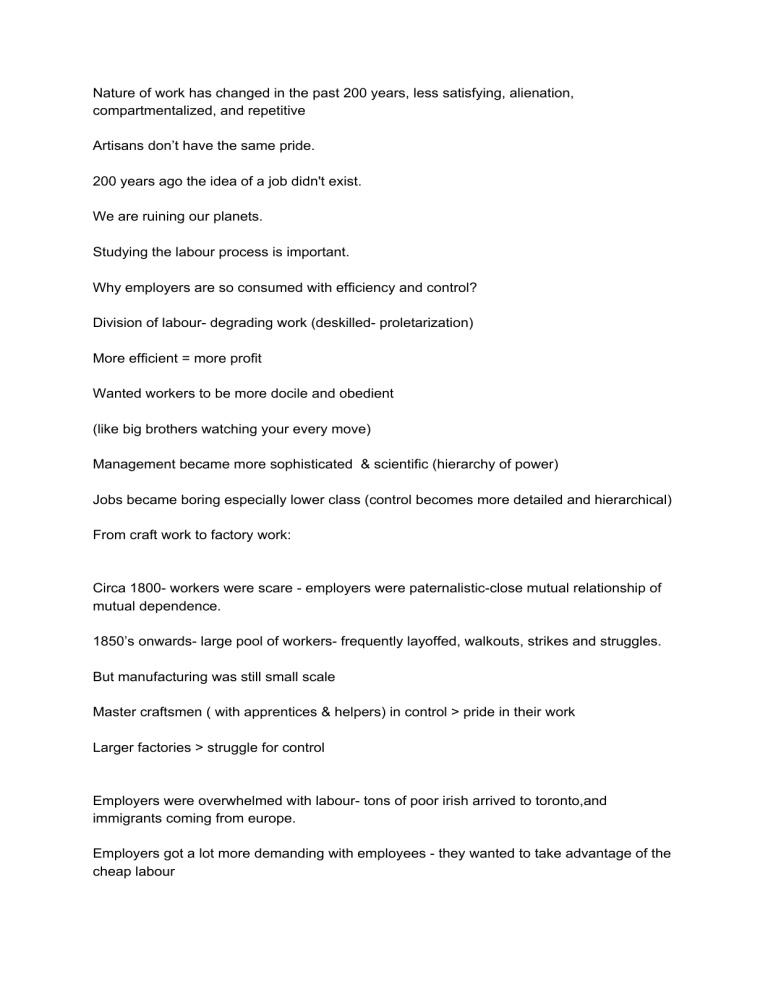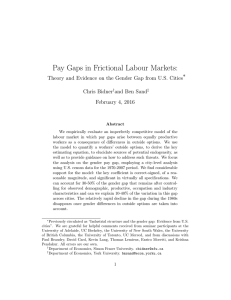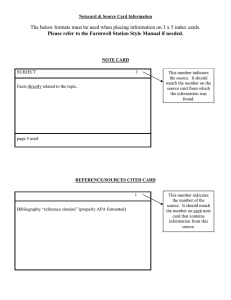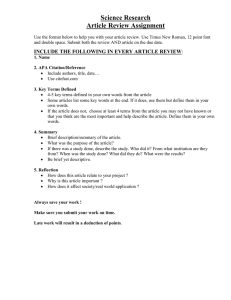
Nature of work has changed in the past 200 years, less satisfying, alienation, compartmentalized, and repetitive Artisans don’t have the same pride. 200 years ago the idea of a job didn't exist. We are ruining our planets. Studying the labour process is important. Why employers are so consumed with efficiency and control? Division of labour- degrading work (deskilled- proletarization) More efficient = more profit Wanted workers to be more docile and obedient (like big brothers watching your every move) Management became more sophisticated & scientific (hierarchy of power) Jobs became boring especially lower class (control becomes more detailed and hierarchical) From craft work to factory work: Circa 1800- workers were scare - employers were paternalistic-close mutual relationship of mutual dependence. 1850’s onwards- large pool of workers- frequently layoffed, walkouts, strikes and struggles. But manufacturing was still small scale Master craftsmen ( with apprentices & helpers) in control > pride in their work Larger factories > struggle for control Employers were overwhelmed with labour- tons of poor irish arrived to toronto,and immigrants coming from europe. Employers got a lot more demanding with employees - they wanted to take advantage of the cheap labour The factory owners wanted to increase production & lower costs. Ford builds bigger factories, highland park plant has 15,000 workers He didn’t want experienced craftsmen 500 supervisors enforced control (very controlling, one firing a day approximately) Henry ford wanted workers to do small tasks, one makes spoke, one makes rings, one guy will put spoke in rings etc. Workers were being hassled, industrial union was formed as a result Fordism (1863-1947) Industrial management based on: Assembly-line methods production of cheap, uniform commodities in high volume. Winning employee loyalty with good wages and a reduced work week. Initially intolerant of unionism but gave in to U.A.W www.youtube.com/watch?tv=DfGs2Y Labour process - the assembly line Employer wants to expand his capital> convert sum into wages. Labour process.generates surplus . employer can accumulate more capital/profits. .to get the most capital. Capitalist owners want to control the labour process so they could boost productivity Regulates hours of work, set rules & regulation Develop detailed division of labour> separate work into minor tasks> separate conception from execution> workers only know one small task Detailed division of labour> deskilling Replace skilled craftsmen by making workers dfo a small tasks to make the job brainless Charles babbage. Babbage principle Break down task > sub-divide work Separate conception from execution Destroy Karl marx - technology and alienation ( no connection to job) Frederick winslow taylor (1856-1911) The principles of scientific management (1911) Find the “one best way” to do a task Using “time and motion studies” he tried to find the most efficient way to perform a task - and eliminate all unnecessary actions or body movements Then set a “optimum daily production rate for each worker” E.g. loading of a railway - taylorism E.g. fast food- timed everything - mcdonalds best way to do things. (systematized) You see it everywhere and everyday - doesn’t take long to train staff Scientific management known as taylorism Used piece rate compensation Taylor saw workers “soldering’ or “slacking off’ at every opportunity and advocated close supervision. (unfair as people who are ill don’t get piece rate) Hourly wage + bonus Soldiers have a bad reputation for relaxing when not in battle - sergeant keep them in control. Security cameras watching what you are doing every minute. Scientific management- think of taylor and three e’s Economic Efficient Effective Keynes and the welfare state - printers strike of 1872 Pressure on employers yet still making money- workers able to become consumers (virtuous cycle) E.g. send kids to school & college. Capitalism takes off - but there were problems (1930’s - great depression) Keynes made sure the government regulated market place Review assignment- librarian Citations - different ways of doing so e.g. apa Factor out citations, I want you to copy out the name of author etc. Anything above 30% is a red flag of plagiarism Readings need to be read New materials that need to be included- contact t.a to make suggestions Movies have to be approved by t.a and books There is a list of acceptable movies to watch on moodle- 50 movies ( not necessarily up to date - list will be amended) Weekly assignments- 3 (the answers are to be found in the textbook) Graduate student shave to come to class having read their textbook (form opinion after already reading textbook) Three strikes in order to score homerun on test. (most of the questions will be from the textbook) Taking quote from textbook use segment quote format ( 2 page essay cram the quote) Direct quotes always need a citation Name at the top of the page, couple of inches of citation is fine Not required to write large essays T.a. are only paid to mark three assignments ( they might indulge the top four if you are lucky) (teacher will try to put questions up earlier) Stephanie comes form business school -they have the best library in that part of campus (across the street) - lot of services you don’t get at scott library Can also go there for job prospects Come back in jan and feb on how to research your essay quailsite@yorku.ca 2nd floor-schulich building - bronfman library (individual study carrels) Six bookable group study room - 2nd floor Scott library -lots of people Lolis library support & services Hours; monday-thursday 8am -11 am Friday: 8am - 6pm https://www.library.yorku.ca/web/ Business chat starts at 10 am , grey out means full Library branches, bronfman website could be in another country you can access resources Library’s search- libraries home Search-sosc 1510: the future of work Course reserves - use professors last name or course code 3 different items on reserve- accessible on scott library Career prospects- next semester Using the library’s website to find specific articles who= author what= article title when= date where=journal title, volume and page Library homes- periodical title e.g. social problems, Go to drop down menu , periodical title search- click find You will get links, choose the right one Sometimes you need to buy journals in overlapping way (many database vendors) Find a subscription link that covers the year it was published e.g. 1996 to present http://academic.oup.com/socpro#\ Issues section, change year to 2010, go back to citation, volume 57, issue 3, (august) Control f and search for keywords Neo-taylorism at work: can look at abstract http://watermark.silverchair.com/scopro57-0421 Second tool - google scholar Searches a subset of internet available content, scholarly journal articles, books, court cases, Limiting and narrowing scope of research Can set up google scholar preferences but don’t always work Library homepage- grey search bar , google scholar Click to access resource Copy title of article in yorku google scholar http://scholar.google.com/scholar?q=Neo-Taylorism+at++++++work%3A+Occupational+cha nge+in+the Don’t know how to pay- don’t have to part of tution Find it @ yorklink on google scholars Sfx.scholars http://academic.oup.com Glendon location-ship stuff Conducting research 1. Understanding assignment 2. Search strategy 3. Conduct research ( find research mistakes) 4. 5. http://spark.library.yorku.ca Spark three sections: Getting started Exploring Pulling it together Each Section has multiple modules www.yorku.ca/spark Book or movie review (book review0 Roman, R - continental crucible (read & summarize book - review relevance to course) Discuss insights it provides on future of work Length: 700-1000 words Use specific citation style, MlA, chicago Potentially use additional books Find out if there are any published book review of content crucible Find additional resources on the north american free trade agreement (Nafta) Scholarly articles- the reshaping of mexican labour experts under nafta : paradoxes and Challenges A book can be a nice intro to a topic- many different chapters Scholarly article- is very niche, specific type of audience Scholarly books- nonfiction and fiction Scholarly books: Provide a broad overview of topic written by scholars/researchers Sometimes not as current due to publishing process Scholarly articles- sometimes peer review ( only 20 page slogan normally) Books on library website Https//:www.library.yorku.ca/find/Search/Results/mylang+en&lookfor Use post search filters to limit search further You Can use book number on it spine Journal articles- research guides (normally won’t find it easily) Library homes, research guides blue link https://www.researchguides.library.yorku.ca/?b=s https://www.researchguides.library.yorku.ca/socialscience Have other links to different resources Sometimes find red findit@york button Should show - scholars portal Click on pdf download button Search strategy - how to combine keywords more effectively (limits search results) Combines similar terms Greater results Makes search broader- synonyms Phrase searching- “double quotation marks” searches it as an exact phrase Truncation - manag* = manager , managing, management etc. ( allows database to look for variant endings) Mexico or migrant workers aern’t synonms (lok for nafta, mexico and migrant workers) comnine with and not or Book review resources- research guide Libray home page- research guides- finding types of info- book reviews, major reosurces drop down options, book review digest, fill in passport york, E.g. “continental crucible” - few bookr eviews Pdf fullt ext - 3 pages long review one of them. Apply the parca test P . A. r . C. A Using research results ehtically through citation E.g. (Harris,2002, p.35) When to cite? Create an in-text reference & a complete citation in assignments bibliography (apa) 2. Create complete citaitons in reference list at the end of the assignemnt Most int ext citations require 3 things: The author’s alst name Paraphrase correctley: Provide an in- text citaion . make sure you have rephrased the idea in your own words apa= e.g. research on nafta shows (smith, 2009) Or .Smith (2009) iluustrates how nafta has Corporate authro example Recent data shows the ( the city of tornto , 2016) Proper quoting in apa Twow ays to cite direct quotes in apa: 1) Quebec supports worker rights ina number of ways in fact “since the socnd half of the 1970’s it has prohibited the use of repelacemtn workers during strikes” (Smith,2001, p.31) 2) Smith (2001) discusses how “quebec has a releatively generous body of labour law (pg. 31) Article excerpt from Belk, 2014, p.1596 (Chicago referenceing are more intensive) Apa refernce list New page at the end of your assignment Provides readers with complete information For the reousrces you cited used (organzied alphabetically by auhtors last name- no bold or underline but itlaics is allowed in numbers) Hanging indent (0.5 inch) Double spaced Four citation resources Article databases soemtime shave a citation button http://ww.researchguides.yorku.ca/bizcitations Drop down menu http://www.researchguides.yorku.ca/c.php?g=679634&p=472 Humbers libraries- apa videos https://library.humber.ca/help/apa/newspaper-articles#main


